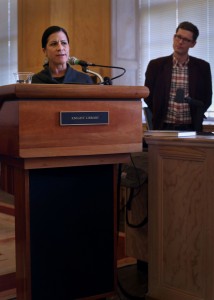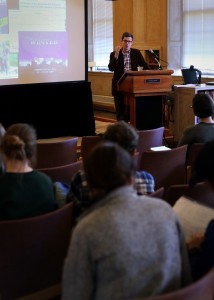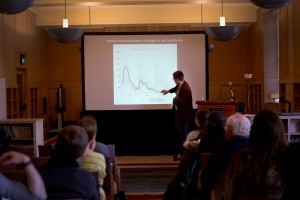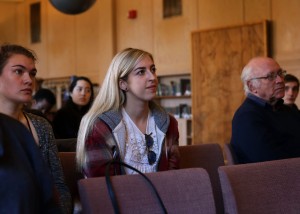CGH Lecture Series No.1
America and the Eradication of Smallpox in the Cold War Era
February 22, 2016
Bob H. Reinhardt, Executive Director, Willamette Heritage Center

Written by: Kylie Juggert
Earlier this February, Bob Reinhardt opened the Center for Global Health guest lecture series with his presentation, “America and the Eradication of Smallpox in the Cold War Era.” The Knight Library Browsing Room was full for the afternoon talk, the complementary coffee and cookies finding new homes in the hands of faculty, staff and students attending the Oregon alumnus’ presentation.
Reinhardt described the story of smallpox as, “an interesting one and filled with drama,” a seemingly counterintuitive description for a disease that was declared eradicated 36 years ago by the WHO. But sophomore Cameron Colbert, a human physiology and Spanish minor, saw the compelling elements Reinhardt described; Colbert said that Reinhardt’s lecture showed him history’s value in understanding the world today.
“I’ve never been a huge fan of history, or literature for that matter,” Colbert said. “But looking at ‘it’ from a medical point of view, the history is just as valuable as what’s happening today, because you can learn a lot from it.”
The ‘it’ that Colbert referred to was the use of Reinhardt’s historical-environmental explanation of the successful smallpox eradication. Dr. Kristin Yarris, one of the Center for Global Health’s co-directors, echoed Colbert’s appreciation of the historical attention included in the lecture.

“I liked that he historicized the [smallpox] global health intervention,” Yarris said after the talk. “It’s important to talk about this history because communicable diseases are all around us… and the global health community is wondering what to do with these new and persistent infectious disease cases. There’s a lot to be learned in this [smallpox] case.”
Current examples of the communicable diseases Yarris mentioned are Ebola, measles and the Zika virus. After the lecture, Reinhardt said these outbreaks – specifically Ebola and measles – were the “aha moments” during his smallpox research and book writing.
“Whenever you write an epilogue, you’re sort of at this moment when you’re thinking, ‘Why did I spend seven years doing this?” Reinhardt said, laughing at his own satirical truth. “But it wasn’t until I got to the epilogue and Ebola was in the news, anti-vaccination was in the news, there had just been a measles outbreak in Disneyland… and I was thinking, ‘This is…this is interesting and important.”
While the next guest speaker for the series has not been released, Yarris said that through these types of events she hopes greater institutional awareness is raised for the global health programming needed at the UO. Colbert echoed this interest on a smaller scale, saying that for now, he just looks forward to the next lecture.
“Oh geez, yeah, I’d love to see more of these talks.”
Photos by: Kylie Juggert


